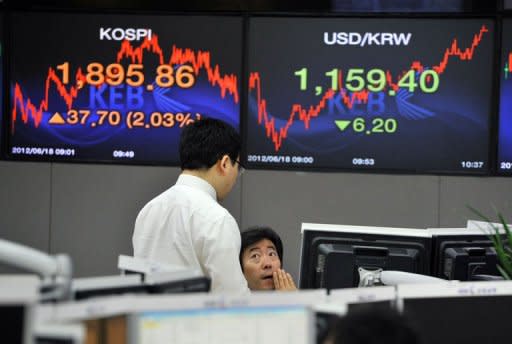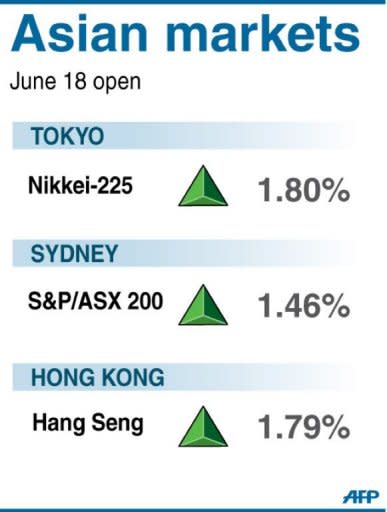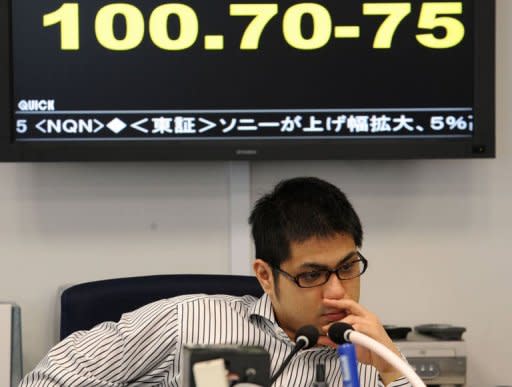Asian markets, euro rally after Greece vote
Asian markets surged Monday and the euro rose after pro-austerity parties came out on top in Greek elections, easing but not ending concerns over whether the country will stay in the single currency. The results were also welcomed by the governments of Japan and China -- two of Europe's biggest creditors -- which called for leaders in Greece to act quickly to form a cabinet. Tokyo stocks jumped 1.77 percent, or 151.70 points, to 8,721.02, Sydney was 1.96 percent higher, or 79.6 points, at 4,136.9, while Seoul climbed 1.81 percent, ending up 33.55 points at 1,891.71. Hong Kong rose 1.01 percent, or 193.87 points, to 19,427.81 and Shanghai closed up 0.40 percent, or 9.20 points, at 2,316.05. Dealers cheered Sunday's result, which saw the New Democracy party win about 30 percent of the vote, just ahead of the radical Syriza group which had campaigned on the promise of tearing up an EU-IMF bailout agreement. New Democracy did not win outright but Greece's electoral system gives it an extra 50 seats in the 300-member parliament for coming first, so that it should be able to form a coalition with the left-leaning, pro-austerity Pasok party. The news boosted the single currency, which surged to morning highs of $1.2727 and 100.86 yen before paring those gains to sit at $1.2709 and 100.64 yen. That was still up from $1.2644 and 99.47 yen in New York trade late Friday. In Europe stock markets opened higher. Athens jumped 6.48 percent, Madrid rose 1.31 percent and Frankfurt opened 1.21 percent higher. The election in Greece was the second in six weeks after May 6 polls failed to produce a government, stoking fears that the political stalemate would paralyse efforts to bring the country back from the brink. The vote essentially became a referendum on the country's membership of the eurozone, with European leaders warning that a win for Syriza would probably see Athens renege on its debt commitments and ultimately exit the bloc. Japan welcomed the result but called on Europe to "urgently" strengthen its financial sector and pressed Greece to swiftly form a new government. "We will be paying close attention to upcoming negotiations to form a coalition," Chief Cabinet Secretary Osamu Fujimura, the government's top spokesman, told reporters in Tokyo. "Our country hopes that a stable government will be launched early and make progress towards stabilising markets," he added. China echoed those sentiments, with the official Xinhua news agency saying in a commentary: "The Greek parties must work together to form a new government quickly and convince the Greek voters of the need for painful austerity." But analysts warned Sunday's developments would not vanquish concerns about the embattled eurozone or Greece's economic future. Yoshikiyo Shimamine, economist at Dai-ichi Life Research Institute in Tokyo, said the election result meant Greece had just "returned where it was before". "They are back to the difficult path they had been taking before. I pay respects to the Greek people who chose this road, but it will be a painful, tough road," he told AFP. "We now have no worries that Greece will leave the euro or declare default suddenly." Kenichi Hirano, operating officer at Tachibana Securities, told Dow Jones Newswires that the election results were "a net buy incentive for stocks" but added that "Greece's problems are far from over". Paul Mackel, head of Asian currency research at HSBC in Hong Kong, said: "There is still some room for disappointment to come in. This is a small bright spot and it could fade briefly." Athens has been forced to seek bailouts twice in recent years totalling about 347 billion euros ($442 billion), and European leaders have warned Greece it must respect its international commitments or risk leaving the euro club. The International Monetary Fund indicated it will set about a renegotiation of Greece's 130-billion-euro bailout programme. "We take note of the election results in Greece and stand ready to engage with the new government on the way forward to help Greece achieve its objective of restoring financial stability, economic growth and jobs," it said. Attention was shifting to the G20 meeting in Mexico over the next two days, where Europe's debt crisis will be discussed ahead of a summit of European leaders next week. Dealers were also looking to a US Federal Reserve policy meeting this week amid hopes it will announce fresh monetary easing to kickstart the US economy, while details were to be released on Spain's 100-billion-euro bank bailout. Oil was mixed, with New York's main contract, light sweet crude for July delivery down 12 cents to $83.91 a barrel and Brent North Sea crude for August delivery rising 14 cents to $97.75. Gold was worth $1,617.40 an ounce at 0810 GMT, compared with $1,625.50 late Friday. In other markets: -- Taipei rose 1.76 percent, or 125.67 points, to 7,281.50. Taiwan Semiconductor Manufacturing Co surged 3.46 percent to Tw$80.8 while Hon Hai Precision ended up 2.37 percent higher at Tw$86.5. -- Wellington closed 0.25 percent, or 8.60 points, higher at 3,455.68. Telecom Corp gained 0.86 percent to NZ$2.49, Fletcher Building was up 0.16 percent at NZ$6.30 and Chorus was down 0.32 percent at NZ$3.10. -- Manila rose 2.43 percent, or 119.78 points, to 5,050.41. Philippine Long Distance Telephone Co. gained 0.68 percent to 2,376 pesos while Universal Robina Corp. gained 4.27 percent to 61 pesos.





